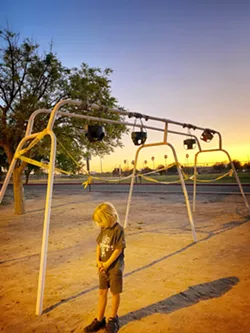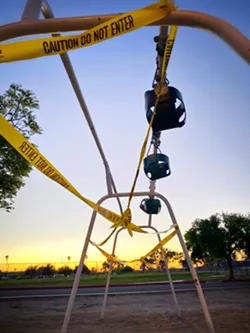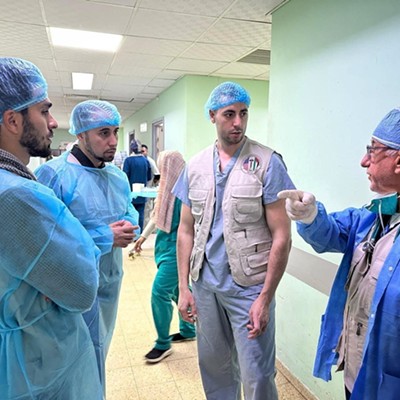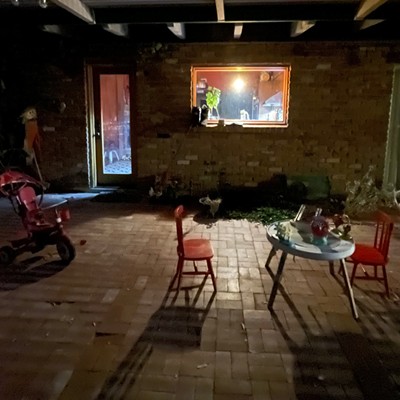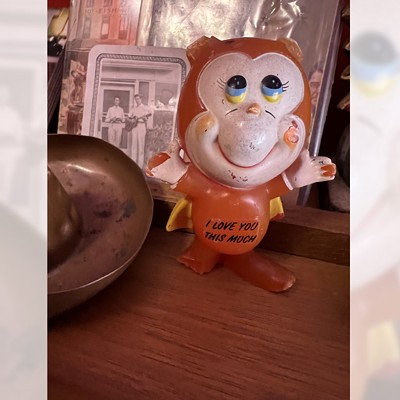I am watching six-year-old Reece negotiate a football with a mechanized toy forklift on our patio. Lucky bees loop the few blooming roses, and the city is so hushed now you can hear their buzz, a 100-cycle hum upholding the springtime ostinato of a natural world springing to life. Reece drops his forklift work to land a suite of punches to my thigh (a recent development), yelping in a loud, high tenor something about Trump and his death to America, and he laughs and screeches and runs in circles, around the outdoor table like some tow-headed Sambo whipping up butter. His mama is inside mixing the pancakes, presumably with the ghee Reece is emulsifying. Our six-month-old Rickie is in my lap simultaneously using a finger to comfort the first teeth breaking her gum and flapping her arms with unmitigated joy to Reece's hijinks.
It is a warm, sunny Tuesday morning in Tucson.
Our children do not have to suffer. There is food to eat, a good house free of domestic abuse to live in, especially during Reece's long school's-out days, which he spends mostly with his "mama" learning Spanish soliloquies, math equations, and creating a chapter book filled with sketches and bilingual descriptions. My history lessons with Reece so far show a kid more fascinated with hows and whys of bloody battlefields than contexts of racism and slavery. He is only just grasping concepts of forced racial, gender and class inequalities, and he is shocked. Reece's thoughtful and gentle biological dad Curtis fathers Reece two nights a week, and tackles the science teachings. My point is the boy is well-looked after. He challenges, dear God, he challenges, but his days are laid out ahead of him filled with some dreaded routine but also unicorns and little green army men and sundry homespun adventures. But there is no social scene, no kids his age, and he spins out of his little head sometimes. I get it, man. Isolation is nothing new for me, but for him? At least the bullies can't get to him.
There is little fear here but there is out beyond our house and it drones and seethes in and out of our collective consciousness like a virus, or the virus, the one of sickened friends and killer of others I've long looked up to. We have a house. I think of that. Just that. How fortunate we are. The refrigerator with some food, the WiFi, the books, the music and movies, the still-controllable financial worries. That stuff.
And those who don't?
I saw a baby maybe Rickie's age in a stroller outside a Dollar Tree store with sugary pastel streaks and grime on his cheeks and dark eye circles. The baby's two older school-age siblings, malnourished and unclean, trudged alongside. The spindly mother was hurting and she just does not have the time for any virus, pushing forward in that speedy hamster-wheel gait to the bus stop, a smoldering cigarette between fingers gripping the pram. I wanted to meet them, selfishly, because this family's palpable adversity ached in my gut: if things weren't bad enough, the COVID-19 could easily seize one and kill them. Or any of us. What could I do? Anyway, mom didn't want any part of a conversation, her harried travel and hurting ankles and bus schedules.
I've known troubled children, and those like me who've grown kicking and screaming into "adults," others I meet in places like Circle K, and at Reece's school, or have written about. I think of their homes or shelters, the dimming lights in those lives, a suddenly unemployed single mom or dad or both, ill-equipped to manage children or foster kids whose knowledge-hungry brains are saddled with fortunes of idle time, too-easily swayed and cut off from friends, and how some can become easy targets of blooming household cruelty caught in lockdown, where a spark-tempered terrorizer wields even more power and fright. How police departments and abuse hotline services around the country are reporting a 20-25 percent increase in domestic-violence calls. It becomes a song in my head, a requiem, tingling in the scars on my body and the shame inside.
I hit up a couple of counselor folks working opposite ends of the financial spectrum for takes on how this pandemic and attendant fears are influencing kids under lockdown. These guys are unsung champs in their fields. Both show zero resentments toward their work but are guarded in their responses to specifics, as they do work with children, yet both agree on the importance of in-person human interaction, the distance between breathing the same air and cold and vast wireless radio waves to far-off screens. Both are working remotely from home. For John Elliott, this is an unprecedented time of need, especially with reduced services and resources for those caught in spirals of poverty.
Elliott supervises a team of developmental specialists from Casa de los Niños embedded within one of El Rio Health's clinics, El Pueblo, on Tucson's south side. I've known Elliott from afar for months. He fights a good fight, working with the overlooked and underserved families, the have-nots and never-hads. His specialty is early childhood mental health, birth to about 8 years old. His team provides developmental and social screenings to families and caregivers of patients, which means he sees some things.
Elliott has two adopted children of his own, which he and his then-spouse first fostered (he shares 50/50 custody). "They are amazing children," he says, "and have shown me not only the negative power that early childhood adversities can have long-term, but also the brilliant and beautiful resilience of the human spirit." He talks of his own children as reflections of himself, the "positivity and humor" he is able to radiate or "present." He chooses the latter word because the pandemic's ugly, more silent infection includes stresses to Elliott as a parent and a professional working with kids.
When the COVID-19 pandemic and stay-at-home orders hit, Elliott's team had to abandon in-person services, which are key to understanding the anguishes and the emotional depth of problems and sufferings among families, caretakers and kids. For one, losing access to the electronic health records meant his team reaches fewer families, and many of these families have been asking for food and other necessities.
His team discovered how limited outside resources for families are now, and the operational outlets are rationing what they do have. Religious organizations in Tucson such as the Gospel Rescue Mission and Interfaith Community Services and other have stepped up to help the community, schools offer pick-up boxed lunches, but families need to have the resources and planning to get there.
The gap in services is steadfast. "This is a tragic consequence," he says.
Elliott's field includes therapy, which is reduced to video platforms, but to remain federally compliant, only certain video services can be used, a huge problem because not all families can access "telehealth," nor do they have fast enough WiFi to stream, if they have it at all.
"Therapy for young children is done within the context of play," Elliott says, "interactions, art, and other mediums that can cover experiences and emotions in ways that are not always verbal. When I was doing therapy, physical cues were wholly crucial to my work. This was true for the children and the adults in their lives. These cues are missed during phone calls and, sometimes, video sessions. When symptoms cannot be seen, they cannot be addressed."
During the 2008 economic collapse and ensuing years, Elliott worked in a unit of the Department of Child Safety (DCS, formerly CPS). He saw a spike in reports of child abuse and DCS involvement, and while he has not seen actual data yet regarding the pandemic, he knows what's up.
"For the children, losing school is losing a crucial outlet for social well-being, structure and routine, and, sometimes, even safety," Elliott says.
Arizona Gov. Doug Ducey closed schools for now—without the need for making this time up. Most, if not all, schools are still providing the curriculum to the families.
There are the critical needs maybe not met in the home, where parents and caregivers are stressed with work and money issues and pandemic fear. Now they need to be teachers too. "Patience can be worn thin, and quickly," Elliott says. "Physical handouts and packets can be given to families who need them, but this only addresses the concern of not being able to access online materials. It cannot be assumed that all parents and caregivers themselves are able to access written material, or have the ability to interpret this information for their children. I mentioned resilience before, and while we all have a certain measure of it, the amount varies from person to person, and it also has a limit. Many children, including my own, run the risk of losing skills that are not kept up with, creating a situation of spending time in the next school year trying to 'catch up' as opposed to moving forward."
He adds that the social determinants of health, especially for the underserved population he works with, are as critical as child development itself. "Many are grateful just to have that outside contact, and to know someone is trying to help them."
Greg Kaczynski is a UA grad now dean of students at a private academy (grades 4-12) in Los Angeles, overseeing gifted students with learning challenges, a school population known as "twice exceptional." He is also one half of the academy's counseling team, helping students' interpersonal conflicts and emotional struggles. He spends some of his free time authoring horror-story fiction.
Many of his students are on the spectrum. It is mostly kids hailing from well-to-dos in the entertainment biz, children of film folk, doctors and lawyers and such, whose parents can also afford private tutors. Kaczynski is hyper-intelligent and intuitive, qualities put to test as he faces child disabilities—including dyslexia, ADHD, dysgraphia and others—but now in lockdown.
Abuse is not a rampant issue within the specific population he works. "However," Kaczynski says, "being stuck at home for an indefinite period of time without any clear light at the end of the tunnel is sure to exacerbate any standing issues within a family system. Anyone who had an older sibling who enjoyed torturing them, or a younger sibling whose shrieking voice was like nails on a chalkboard while growing up, doesn't need much imagination to consider how challenging lockdown with family members can be." His counseling offices are safe places where students speak their minds without worry of getting in trouble. With remote lockdown learning, he says, beyond the technology issues—internet troubles, computer issues—struggles amplify. Kids pulled from the school environment diminishes the connection Kaczynski and other faculty members have fostered with them over time. The lack of one-on-one attention, under which his kids really thrive, the human contact they get in the building, is gone. The teachers are still available to help when they can, but ...
"That's all changed under lockdown," he says. "And it's not just the focus and attention from the teachers, it's the learning space that has gone away.
They've suddenly found themselves in their bedroom, surrounded by their video game consoles, their flat-screen TVs, their pets, any number of distractions that are far more entertaining and far less challenging than their school work. I will say that the kids have been surprisingly flexible with the vast amount of change that came their way in a short amount of time."
Kaczynski worries of students losing hope, abilities to gaze ahead to better times, their excitement and enthusiasm for the work receding, the onset of depression and anxiety. He worries of the unease of the family system trickling down to the kids.
In the last three years he has seen a "spike in anxiety in my kids, and I would argue that a large part of that is the stress and anxiety their parents have been feeling since Trump became president. This lockdown has not made any of this easier."
When night sinks down on Tucson, a different apprehension kicks in. I still dream of cold beers inside old bars full of happy and sour drunks, but I can't drink anymore and won't leave a family hanging. I wonder now how many others who can drink have that same dream now? Because we are now living out a bad dream, one partly fueled by a dehumanizing presidency willing to offer up its citizens to save the world's wealthiest economy, how frivolously he wears his solipsism, lies and contempt for poor people and non-whites. It seeps in, man. What if this was worse? Like a climate-change catastrophe birthing some much deadlier virus? It is all coming. This pandemic is just a prologue to another time.
You can go ahead and call this entry-level rhetoric, but when this virus passes I'm hoping for more empathy and compassion in the world, coming from every direction, amorphous. At least for Reece and Rickie Rose and all the kids. The world belongs to them now. Empathy will give rise to anything good, it always does. Onward and upward, as an old editor would always say to me. Onward and upward.
It is Wednesday evening and we are at one of Reece's favorite parks, Rickie is perched in mama's arms. The angle of dusk newly weighted with that recurring drone of sadness, beyond the usual of empty playgrounds and the far-off figure walking a dog. Caution tape ropes off the play-area's sets and slides, but the burnt orange sunset offers a welcome heart lift. Young Reece has nothing to play on here, no one to play with. When the sun falls and the lights come on, we move toward home to escape the inescapable.

